Mineral Supplement Market
Mineral Supplement Market Size and Share Forecast Outlook 2025 to 2035
Mineral supplement market is projected to grow from USD 15.8 billion in 2025 to USD 24.3 billion by 2035, at a CAGR of 4.4%. Calcium will dominate with a 35.0% market share, while tablets will lead the form segment with a 40.0% share.
Mineral Supplement Market Forecast and Outlook 2025 to 2035
The global mineral supplement market is projected to grow from USD 15.8 billion in 2025 to approximately USD 24.3 billion by 2035, recording an absolute increase of USD 8.5 billion over the forecast period. This translates into a total growth of 53.8%, with the market forecast to expand at a CAGR of 4.4% between 2025 and 2035.
The market size is expected to grow by nearly 1.5X during the same period, supported by increasing demand for preventive healthcare solutions, rising adoption in pharmaceutical and e-commerce channels, and increasing focus on advanced nutritional technologies across the global health and wellness sectors.
Quick Stats for Mineral Supplement Market
- Mineral Supplement Market Value (2025): USD 15.8 billion
- Mineral Supplement Market Forecast Value (2035): USD 24.3 billion
- Mineral Supplement Market Forecast CAGR: 4.4%
- Leading Mineral in Mineral Supplement Market: Calcium (35.0%)
- Key Growth Regions in Mineral Supplement Market: Asia Pacific, North America, and Europe
- Key Players in Mineral Supplement Market: Haleon, Bayer, Church & Dwight, Nature Made, Jamieson, Amway, Swisse, Blackmores
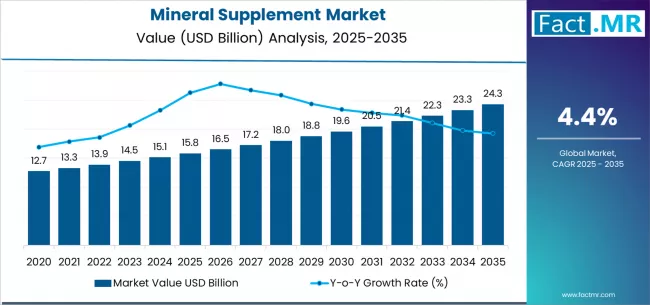
Between 2025 and 2030, the mineral supplement market is projected to expand from USD 15.8 billion to USD 19.8 billion, resulting in a value increase of USD 4.0 billion, which represents 46.5% of the total forecast growth for the decade. This phase of development will be shaped by rising demand for nutritional health solutions, increasing applications in preventive healthcare optimization, and growing penetration in emerging wellness markets. Healthcare providers and retailers are expanding their mineral supplement capabilities to address the growing demand for advanced nutritional systems in various pharmacy applications and consumer health operations.
Mineral Supplement Market Key Takeaways
| Metric | Value |
|---|---|
| Estimated Value in (2025E) | USD 15.8 billion |
| Forecast Value in (2035F) | USD 24.3 billion |
| Forecast CAGR (2025 to 2035) | 4.4% |
From 2030 to 2035, the market is forecast to grow from USD 19.8 billion to USD 24.3 billion, adding another USD 4.5 billion, which constitutes 53.5% of the ten-year expansion. This period is expected to be characterized by the expansion of advanced pharmaceutical facilities, the integration of cutting-edge nutritional technologies, and the development of customized supplement systems for specific health applications. The growing adoption of premium health standards and wellness requirements will drive demand for ultra-high quality mineral supplement systems with enhanced performance specifications and consistent nutritional characteristics.
Between 2020 and 2025, the mineral supplement market experienced steady expansion, driven by increasing recognition of nutritional health technologies' importance in preventive healthcare operations and growing acceptance of advanced wellness solutions in complex health management applications. The market developed as healthcare providers and consumers recognized the need for high-efficiency nutritional systems to address health requirements and improve wellness outcomes. Research and development activities have begun to emphasize the importance of advanced mineral supplement technologies in achieving better efficiency and quality in health management processes.
Why is the Mineral Supplement Market Growing?
Market expansion is being supported by the increasing demand for preventive healthcare solutions and the corresponding need for high-efficiency nutritional systems in mineral supplement applications across global pharmacy and wellness operations. Modern healthcare providers and consumers are increasingly focused on advanced mineral supplement technologies that can improve health outcomes, reduce healthcare costs, and enhance nutritional performance while meeting stringent safety requirements. The proven efficacy of mineral supplement products in various health applications makes them an essential component of comprehensive wellness strategies and preventive healthcare programs.
The growing emphasis on health industry transformation and advanced wellness optimization is driving demand for ultra-efficient mineral supplement systems that meet stringent performance specifications and safety requirements for health applications. Healthcare providers' and consumers' preference for reliable, high-performance nutritional systems that can ensure consistent health outcomes is creating opportunities for innovative mineral supplement technologies and customized formulation solutions. The rising influence of health guidelines and wellness protocols is also contributing to increased adoption of premium-grade mineral supplement systems across different health applications and wellness systems requiring advanced nutritional technology.
Opportunity Pathways - Mineral Supplement Market
The mineral supplement market represents a specialized growth opportunity, expanding from USD 15.8 billion in 2025 to USD 24.3 billion by 2035 at a 4.4% CAGR. As healthcare providers and consumers prioritize health optimization, regulatory compliance, and nutritional performance in complex wellness operations, mineral supplement systems have evolved from a niche health product to an essential component enabling health management, wellness optimization, and multi-stage healthcare production across pharmacy operations and specialized wellness applications.
The convergence of health industry expansion, increasing nutritional adoption, specialized wellness organization growth, and health requirements creates momentum in demand. High-efficiency formulations offering superior nutritional performance, cost-effective calcium variants balancing performance with economics, and specialized multi-mineral variants for critical applications will capture market premiums, while geographic expansion into high-growth Asian health markets and emerging market penetration will drive volume leadership. Health industry emphasis on product quality and nutritional reliability provides structural support.
- Pathway A - Calcium Dominance: Leading with 35.0% market share, calcium applications drive primary demand through complex health workflows requiring comprehensive nutritional systems for wellness development. Advanced formulations enabling improved health performance, reduced deficiency risks, and enhanced wellness outcomes command premium pricing from healthcare providers and consumers requiring stringent performance specifications and regulatory compliance. Expected revenue pool: USD 5.5-8.5 billion.
- Pathway B - Pharmacy Channel Leadership: Dominating with 45.0% market share through an optimal balance of performance and accessibility, pharmacy channels serve most healthcare operations while meeting nutritional distribution requirements. This channel addresses both performance standards and economic considerations, making it the preferred choice for health and wellness operations seeking reliable nutritional access. Opportunity: USD 7.1-11.0 billion.
- Pathway C - Asian Market Acceleration: China (6.0% CAGR) and India (6.8% CAGR) lead global growth through healthcare infrastructure expansion, wellness capability development, and domestic mineral supplement demand. Strategic partnerships with local healthcare providers, regulatory compliance expertise, and supply chain localization enable the expansion of nutritional technology in major health hubs. Geographic expansion upside: USD 3.2-5.0 billion.
- Pathway D - Tablet Form Premium Segment: Tablets serve specialized applications requiring exceptional performance specifications for critical health processes. Tablet formulations supporting traditional dosing requirements, complex health applications, and performance-sensitive processes command significant premiums from advanced healthcare organizations and specialized wellness facilities. Revenue potential: USD 6.3-9.7 billion.
- Pathway E - Advanced Processing & Technology Systems: Companies investing in sophisticated mineral supplement technologies, nutritional processing systems, and automated wellness processes gain competitive advantages through consistent system performance and product quality reliability. Advanced capabilities enabling customized specifications and rapid deployment capture premium healthcare partnerships. Technology premium: USD 2.0-3.5 billion.
- Pathway F - Supply Chain Optimization & Reliability: Specialized distribution networks, strategic inventory management, and reliable supply chain systems create competitive differentiation in health markets requiring consistent mineral supplement availability. Companies offering guaranteed supply security, technical support, and regulatory documentation gain preferred supplier status with compliance-focused healthcare providers. Supply chain value: USD 1.5-2.8 billion.
- Pathway G - Emerging Applications & Market Development: Beyond traditional calcium applications, mineral supplements in multi-mineral formulations, specialized delivery systems represent growth opportunities. Companies developing new applications, supporting R&D initiatives, and expanding into adjacent health markets capture incremental demand while diversifying revenue streams. Emerging opportunity: USD 1.2-2.2 billion.
Segmental Analysis
The market is segmented by mineral type, form, distribution channel, and region. By mineral type, the market is divided into calcium, magnesium, iron, zinc, and multi-mineral. Based on form, the market is categorized into tablets, capsules/softgels, gummies/liquids, and powders. By distribution channel, the market is divided into pharmacy, e-commerce, mass retail, and others. Regionally, the market is divided into Asia Pacific, North America, Europe, Latin America, Middle East & Africa.
By Mineral Type, Calcium Segment Accounts for 35% Market Share
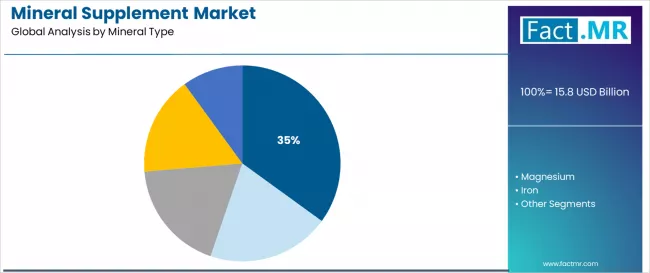
The calcium segment is projected to account for 35% of the mineral supplement market in 2025, reaffirming its position as the category's dominant mineral type. Healthcare providers and consumers increasingly recognize the optimal balance of performance and cost-effectiveness offered by calcium supplements for most health applications, particularly in bone health and wellness operations. This mineral type addresses both performance requirements and economic considerations while providing reliable nutritional benefits across diverse health applications.
This mineral type forms the foundation of most health protocols for nutritional applications, as it represents the most widely accepted and commercially viable level of mineral supplement technology in the industry. Quality control standards and extensive health testing continue to strengthen confidence in calcium formulations among healthcare providers and consumers. With increasing recognition of the cost-performance optimization requirements in health management, calcium systems align with both operational efficiency and health goals, making them the central growth driver of comprehensive wellness strategies.
By Form, Tablets Segment Accounts for 40% Market Share
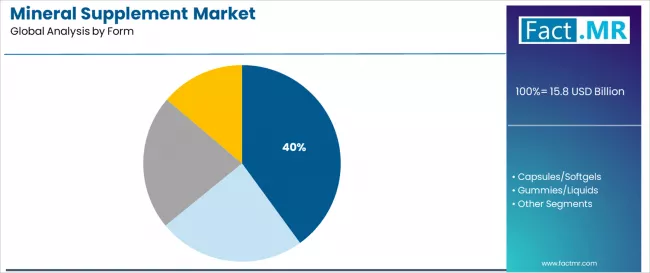
Tablets are projected to represent 40% of mineral supplement demand in 2025, underscoring their role as the primary form segment driving market adoption and growth. Healthcare providers and consumers recognize that tablet requirements, including precise dosing processes, specialized formulation needs, and multi-stage manufacturing systems, often require advanced mineral supplement products that standard nutritional technologies cannot adequately provide. Tablets offer enhanced dosing accuracy and regulatory compliance in health applications.
The segment is supported by the growing nature of tablet adoption, requiring sophisticated formulation systems, and the increasing recognition that advanced tablet technologies can improve health performance and wellness outcomes. Healthcare providers and consumers are increasingly adopting evidence-based health guidelines that recommend specific tablet formulations for optimal health outcomes. As understanding of nutritional complexity advances and health requirements become more stringent, tablets will continue to play a crucial role in comprehensive health strategies within the wellness market.
What are the Drivers, Restraints, and Key Trends of the Mineral Supplement Market?
The mineral supplement market is advancing steadily due to increasing recognition of nutritional health technologies' importance and growing demand for high-efficiency wellness systems across the healthcare and consumer wellness sectors. The market faces challenges, including complex regulatory processes, potential for quality variations during manufacturing and storage, and concerns about supply chain consistency for specialized nutritional products. Innovation in mineral supplement technologies and customized health protocols continues to influence product development and market expansion patterns.
Expansion of Advanced Healthcare Facilities and Mineral Supplement Technologies
The growing adoption of advanced healthcare facilities is enabling the development of more sophisticated mineral supplement production and quality control systems that can meet stringent health safety requirements. Specialized health facilities offer comprehensive mineral supplement services, including advanced processing and nutritional delivery processes that are particularly important for achieving high-efficiency requirements in health applications. Advanced distribution channels provide access to premium products that can optimize health performance and reduce wellness costs while maintaining cost-effectiveness for large-scale health operations.
Integration of Digital Health Systems and Nutritional Management Systems
Modern health organizations are incorporating digital technologies such as real-time quality monitoring, automated processing systems, and supply chain integration to enhance mineral supplement handling and distribution processes. These technologies improve product performance, enable continuous quality monitoring, and provide better coordination between suppliers and consumers throughout the health cycle. Advanced digital platforms also enable customized performance specifications and early identification of potential quality deviations or supply disruptions, supporting reliable nutritional product delivery.
Analysis of the Mineral Supplement Market by Key Country
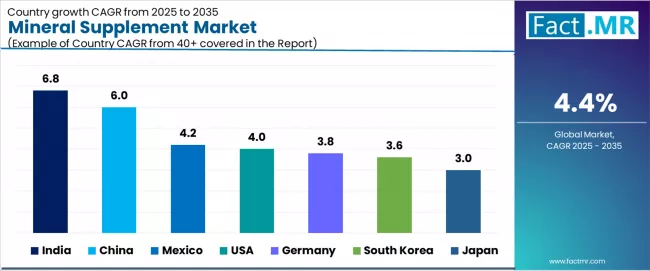
| Country | CAGR (2025-2035) |
|---|---|
| India | 6.8% |
| China | 6.0% |
| Mexico | 4.2% |
| USA | 4.0% |
| Germany | 3.8% |
| South Korea | 3.6% |
| Japan | 3.0% |
The mineral supplement market is experiencing varied growth globally, with India leading at a 6.8% CAGR through 2035, driven by the expansion of healthcare infrastructure development, increasing wellness capabilities, and growing domestic demand for high-efficiency mineral supplement systems. China follows at 6.0%, supported by health industry expansion, growing recognition of advanced nutritional technology importance, and expanding wellness capacity. Mexico records 4.2% growth, with focus on developing healthcare and wellness industries. USA shows 4.0% growth, representing an established market with advanced health frameworks. Germany demonstrates 3.8% growth, emphasizing healthcare infrastructure expansion and systematic wellness approaches. South Korea maintains 3.6% growth, driven by premium health technology adoption. Japan demonstrates 3.0% growth, emphasizing precision health management and wellness optimization.
India Demonstrates Growing Market Potential with Healthcare Infrastructure Development
Revenue from mineral supplements in India is projected to exhibit robust growth with a CAGR of 6.8% through 2035, driven by ongoing healthcare expansion and increasing recognition of high-efficiency mineral supplement systems as essential nutritional components for complex wellness processes. The country's expanding healthcare infrastructure and growing availability of specialized nutritional capabilities are creating significant opportunities for mineral supplement adoption across both domestic and export-oriented health facilities. Major international and domestic health companies are establishing comprehensive distribution and wellness networks to serve the growing population of healthcare providers and wellness facilities requiring high-performance mineral supplement systems across pharmacy and health applications throughout India's major healthcare hubs.
The Indian government's strategic emphasis on healthcare modernization and wellness advancement is driving substantial investments in specialized nutritional capabilities. This policy support, combined with the country's large domestic health market and expanding wellness requirements, creates a favorable environment for the mineral supplement market development. Indian healthcare providers and consumers are increasingly focusing on high-value nutritional technologies to improve health capabilities, with mineral supplements representing a key component in this healthcare transformation.
- Government initiatives supporting healthcare development and wellness modernization are driving demand for high-efficiency mineral supplement systems throughout major healthcare and wellness centers, including Mumbai, Delhi, and Bangalore regions.
- Wellness capacity expansion and nutritional system development are supporting appropriate utilization of mineral supplements among healthcare providers and wellness facilities nationwide, with particular growth in pharmacy operations and health services.
China Demonstrates Exceptional Market Potential with Health Industry Growth
Demand for mineral supplements in China is expanding at a CAGR of 6.0%, supported by increasing healthcare accessibility, growing wellness awareness, and developing nutritional market presence across the country's major health clusters. The country's large health sector and increasing recognition of advanced mineral supplement systems are driving demand for effective high-efficiency nutritional solutions in both healthcare and wellness applications. International health companies and domestic providers are establishing comprehensive distribution channels to serve the growing demand for quality mineral supplement systems while supporting the country's position as an emerging nutritional market.
China's health sector continues to benefit from favorable wellness policies, expanding healthcare capabilities, and cost-competitive health infrastructure development. The country's focus on becoming a global health technology hub is driving investments in specialized mineral supplement technology and wellness infrastructure. This development is particularly important for mineral supplement applications, as healthcare providers seek reliable domestic sources for critical nutritional products to reduce import dependency and improve supply chain security.
- Rising awareness about advanced nutritional options and improving healthcare capabilities are creating opportunities for specialized mineral supplement systems across health and wellness settings in major hubs like Beijing, Shanghai, and Guangzhou.
- Growing healthcare infrastructure development and technology adoption are supporting increased access to high-efficiency mineral supplements among organizations requiring comprehensive nutritional capabilities, particularly in healthcare and wellness organizations.
Mexico Shows Strong Regional Development
Mineral supplement market in Mexico demonstrates solid growth potential with a 4.2% CAGR through 2035, driven by expanding healthcare capabilities, growing wellness industry development, and increasing recognition of premium nutritional products in health operations. The country's strategic position as a regional healthcare hub and growing domestic demand for high-quality nutritional products are creating substantial opportunities for mineral supplement adoption across both traditional and modern health facilities. International health companies and local wellness providers are establishing comprehensive nutritional supply networks to serve Mexico's expanding health industry requirements.
The Mexican health sector benefits from favorable trade relationships, expanding wellness infrastructure, and growing consumer awareness of quality health products. Government initiatives supporting health industry modernization and wellness development are driving investments in advanced nutritional technologies. Mexican healthcare providers and consumers are increasingly adopting international quality standards and health technologies, with mineral supplements representing an important component in achieving premium health specifications and meeting wellness market requirements.
- Health industry expansion programs and wellness development initiatives are creating demand for specialized mineral supplement systems across major healthcare regions, including Mexico City, Guadalajara, and Monterrey metropolitan areas.
- Growing pharmacy and wellness sectors are driving increased utilization of mineral supplement products among healthcare providers seeking to improve health outcomes and wellness efficiency in both domestic and export-oriented operations.
USA Maintains Technology Leadership
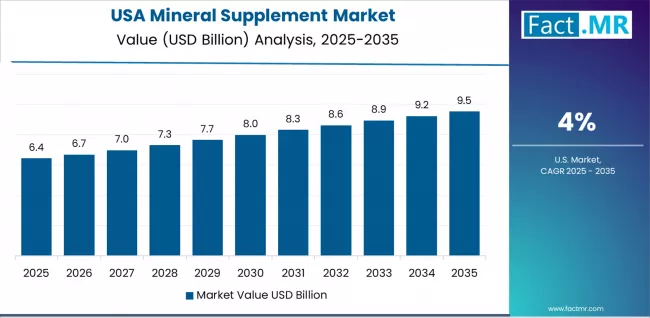
The advanced health technology market in the USA demonstrates sophisticated wellness deployment with documented mineral supplement effectiveness in healthcare departments and wellness centers through integration with existing health systems and wellness infrastructure. The country leverages health expertise in nutritional technology and wellness systems integration to maintain a 4.0% CAGR through 2035. Healthcare centers, including major metropolitan areas, showcase premium installations where mineral supplement systems integrate with comprehensive health information systems and wellness platforms to optimize health accuracy and operational workflow effectiveness.
American healthcare providers and consumers prioritize system reliability and regulatory compliance in wellness development, creating demand for premium systems with advanced features, including quality validation and integration with US health standards. The market benefits from established health industry infrastructure and a willingness to invest in advanced mineral supplement technologies that provide long-term operational benefits and compliance with health regulations.
Germany Shows Strong Regional Leadership
Mineral supplement market expansion in Germany benefits from diverse health demand, including wellness modernization in Berlin and Munich, health development programs, and government wellness programs that increasingly incorporate mineral supplement solutions for health enhancement applications. The country maintains a 3.8% CAGR through 2035, driven by rising health awareness and increasing adoption of nutritional benefits, including superior wellness capabilities and reduced health complexity.
Market dynamics focus on cost-effective mineral supplement solutions that balance advanced health features with affordability considerations important to German health operators. Growing healthcare infrastructure creates demand for modern nutritional systems in new wellness facilities and health equipment modernization projects.
Strategic Market Considerations:
- Healthcare and wellness segments leading growth with focus on health enhancement and operational efficiency applications
- Regional health requirements are driving a diverse product portfolio from basic mineral supplement systems to advanced wellness platforms
- Import dependency challenges offset by potential local development partnerships with international nutritional manufacturers
- Government health initiatives beginning to influence procurement standards and wellness requirements
South Korea Demonstrates Premium Market Development
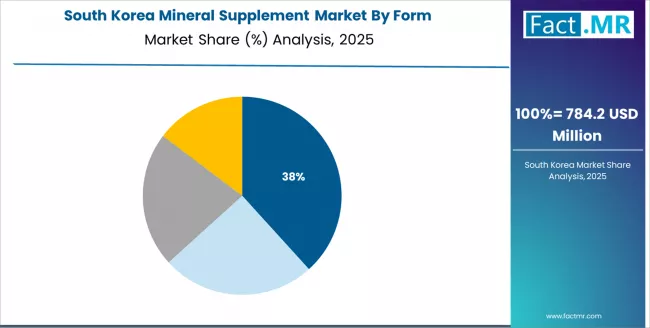
Mineral supplement market in South Korea exhibits steady growth with a 3.6% CAGR through 2035, characterized by advanced health capabilities, premium nutritional adoption, and sophisticated wellness standards across the country's concentrated health industry clusters. The market benefits from high consumer quality expectations, advanced health technology infrastructure, and strong government support for health industry innovation. Korean healthcare providers and consumers are increasingly incorporating international nutritional standards and advanced wellness technologies to meet both domestic premium market demands and health requirements.
The country's focus on health safety, quality control, and technological advancement creates favorable conditions for premium mineral supplement adoption across specialized health applications. South Korean health companies prioritize product traceability, quality consistency, and wellness efficiency, driving demand for high-specification mineral supplement systems that meet stringent health requirements. The market also benefits from strong research and development capabilities and close integration with global health technology trends.
- Advanced health facilities in Seoul, Busan, and Incheon regions are driving demand for premium mineral supplement systems that meet sophisticated quality control and wellness efficiency requirements.
- Growing pharmacy and e-commerce sectors, combined with expanding health product distribution, are supporting increased adoption of specialized mineral supplement products among healthcare providers focused on premium health development and wellness market penetration.
Japan Emphasizes Precision and Integration Excellence
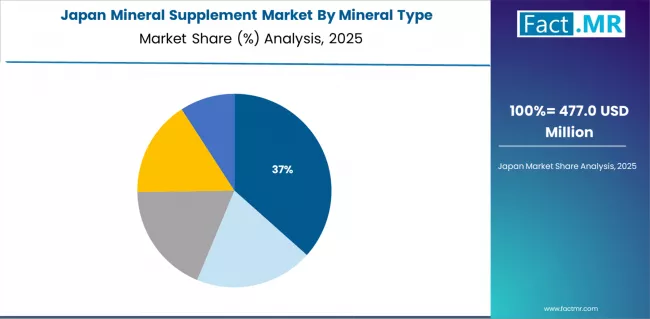
Japan demonstrates steady market development with a 3.0% CAGR through 2035, distinguished by health operators' preference for high-quality mineral supplement systems that integrate seamlessly with existing health equipment and provide reliable long-term operation in specialized wellness applications. The market prioritizes advanced features, including precision health algorithms, quality validation, and integration with comprehensive health platforms that reflect Japanese health expectations for technological sophistication and operational excellence.
Japanese healthcare providers and consumers focus on system reliability and precision in mineral supplement development, creating demand for premium systems with advanced features including automated quality monitoring and comprehensive wellness support. The market benefits from established health research infrastructure and investment in nutritional technology that provides long-term health benefits.
Strategic Market Indicators:
- Premium focus on precision systems with advanced health algorithms and high-reliability capabilities
- Integration requirements with existing health information systems and wellness management platforms
- Emphasis on mineral supplement reliability and long-term performance in health applications
Europe Market Split by Country
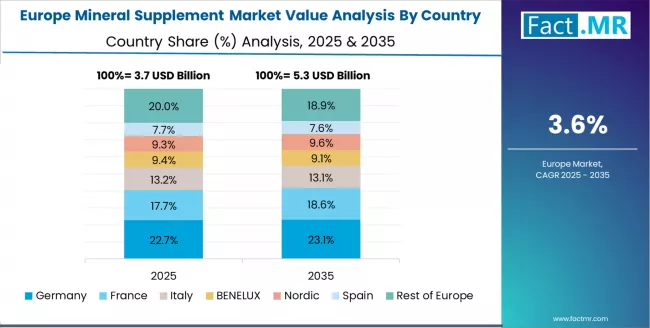
The mineral supplement market in Europe is projected to grow from USD 15.8 billion in 2025 to USD 24.3 billion by 2035, registering a CAGR of 4.4% over the forecast period. Germany is expected to maintain its leadership position with a 23.8% market share in 2025, rising to 24.0% by 2035, supported by its advanced healthcare infrastructure, precision wellness capabilities, and strong health industry presence throughout major wellness regions.
The United Kingdom follows with a 17.1% share in 2025, projected to reach 17.2% by 2035, driven by advanced health protocols, wellness innovation integration, and expanding specialty health networks serving both domestic and international markets. France holds a 14.2% share in 2025, expected to increase to 14.4% by 2035, supported by healthcare infrastructure expansion and growing adoption of high-efficiency mineral supplement systems. Italy commands a 11.4% share in 2025, projected to reach 11.5% by 2035, while Spain accounts for 9.5% in 2025, expected to reach 9.6% by 2035. The Rest of Europe region, including Nordic countries, Eastern Europe, and smaller Western European markets, is anticipated to hold 24.0% in 2025, declining slightly to 23.3% by 2035, attributed to market consolidation toward larger core markets with established healthcare and wellness capabilities.
Competitive Landscape of the Mineral Supplement Market
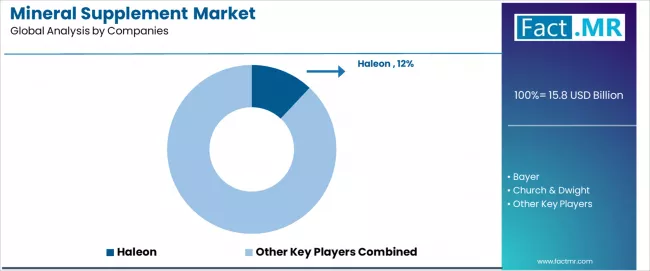
The mineral supplement market is characterized by competition among established health product manufacturers, specialty nutritional companies, and wellness technology suppliers focused on delivering high-efficiency, consistent, and reliable mineral supplement systems. Companies are investing in nutritional technology advancement, quality control enhancement, strategic partnerships, and customer technical support to deliver effective, efficient, and reliable mineral supplement solutions that meet stringent health and wellness requirements. Health optimization, quality validation protocols, and supply chain strategies are central to strengthening product portfolios and market presence.
Haleon leads the market with comprehensive high-efficiency mineral supplement system offerings with a focus on quality consistency and health reliability for wellness applications. Bayer provides specialized nutritional systems with emphasis on health applications and comprehensive technical support services. Church & Dwight focuses on advanced mineral supplement technologies and customized health solutions for nutritional systems serving global markets. Nature Made delivers established health systems with strong quality control systems and customer service capabilities.
Jamieson operates with a focus on bringing innovative mineral supplement technologies to specialized health applications and emerging markets. Amway provides comprehensive nutritional system portfolios, including advanced mineral supplements, across multiple health applications and wellness processes. Swisse specializes in customized health solutions and quality management systems for wellness systems with emphasis on regulatory compliance. Blackmores provides reliable supply chain solutions and technical expertise to enhance market accessibility and customer access to essential mineral supplement systems.
Key Players in the Mineral Supplement Market
- Haleon
- Bayer
- Church & Dwight
- Nature Made (Pharmavite)
- Jamieson
- Amway
- Swisse
- Blackmores
- NOW Foods
- BY-HEALTH
- Kirkland
- Walgreens
- Nestlé Health
- P&G
- Reckitt
Scope of the Report
| Items | Values |
|---|---|
| Quantitative Units (2025) | USD 15.8 billion |
| Mineral Type | Calcium, Magnesium, Iron, Zinc, Multi-mineral |
| Form | Tablets, Capsules/Softgels, Gummies/Liquids, Powders |
| Distribution Channel | Pharmacy, E-commerce, Mass Retail, Others |
| Regions Covered | Asia Pacific, North America, Europe, Latin America, Middle East & Africa |
| Countries Covered | China, USA, Germany, Japan, India, South Korea, Mexico and 40+ countries |
| Key Companies Profiled | Haleon, Bayer, Church & Dwight, Nature Made, Jamieson, Amway, Swisse, and Blackmores |
| Additional Attributes | Dollar sales by mineral type and form, regional demand trends, competitive landscape, healthcare provider preferences for specific mineral supplement systems, integration with specialty health supply chains, innovations in nutritional technologies, quality monitoring, and wellness optimization |
Mineral Supplement Market by Segments
-
Mineral Type:
- Calcium
- Magnesium
- Iron
- Zinc
- Multi-mineral
-
Form:
- Tablets
- Capsules/Softgels
- Gummies/Liquids
- Powders
-
Distribution Channel:
- Pharmacy
- E-commerce
- Mass Retail
- Others
-
Region:
-
Asia Pacific
- China
- India
- Japan
- South Korea
- ASEAN
- Australia & New Zealand
- Rest of Asia Pacific
-
North America
- United States
- Canada
- Mexico
-
Europe
- Germany
- United Kingdom
- France
- Italy
- Spain
- Nordic
- BENELUX
- Rest of Europe
-
Latin America
- Brazil
- Argentina
- Chile
- Rest of Latin America
-
Middle East & Africa
- Kingdom of Saudi Arabia
- Other GCC Countries
- Turkey
- South Africa
- Other African Countries
- Rest of Middle East & Africa
-
Table of Content
- Executive Summary
- Global Market Outlook
- Demand to side Trends
- Supply to side Trends
- Technology Roadmap Analysis
- Analysis and Recommendations
- Market Overview
- Market Coverage / Taxonomy
- Market Definition / Scope / Limitations
- Market Background
- Market Dynamics
- Drivers
- Restraints
- Opportunity
- Trends
- Scenario Forecast
- Demand in Optimistic Scenario
- Demand in Likely Scenario
- Demand in Conservative Scenario
- Opportunity Map Analysis
- Product Life Cycle Analysis
- Supply Chain Analysis
- Investment Feasibility Matrix
- Value Chain Analysis
- PESTLE and Porter’s Analysis
- Regulatory Landscape
- Regional Parent Market Outlook
- Production and Consumption Statistics
- Import and Export Statistics
- Market Dynamics
- Global Market Analysis 2020 to 2024 and Forecast, 2025 to 2035
- Historical Market Size Value (USD Million) Analysis, 2020 to 2024
- Current and Future Market Size Value (USD Million) Projections, 2025 to 2035
- Y to o to Y Growth Trend Analysis
- Absolute $ Opportunity Analysis
- Global Market Pricing Analysis 2020 to 2024 and Forecast 2025 to 2035
- Global Market Analysis 2020 to 2024 and Forecast 2025 to 2035, By Mineral Type
- Introduction / Key Findings
- Historical Market Size Value (USD Million) Analysis By Mineral Type , 2020 to 2024
- Current and Future Market Size Value (USD Million) Analysis and Forecast By Mineral Type , 2025 to 2035
- Calcium
- Magnesium
- Iron
- Zinc
- Multi-mineral
- Y to o to Y Growth Trend Analysis By Mineral Type , 2020 to 2024
- Absolute $ Opportunity Analysis By Mineral Type , 2025 to 2035
- Global Market Analysis 2020 to 2024 and Forecast 2025 to 2035, By Form
- Introduction / Key Findings
- Historical Market Size Value (USD Million) Analysis By Form, 2020 to 2024
- Current and Future Market Size Value (USD Million) Analysis and Forecast By Form, 2025 to 2035
- Tablets
- Capsules/Softgels
- Gummies/Liquids
- Powders
- Y to o to Y Growth Trend Analysis By Form, 2020 to 2024
- Absolute $ Opportunity Analysis By Form, 2025 to 2035
- Global Market Analysis 2020 to 2024 and Forecast 2025 to 2035, By Region
- Introduction
- Historical Market Size Value (USD Million) Analysis By Region, 2020 to 2024
- Current Market Size Value (USD Million) Analysis and Forecast By Region, 2025 to 2035
- North America
- Latin America
- Western Europe
- Eastern Europe
- East Asia
- South Asia and Pacific
- Middle East & Africa
- Market Attractiveness Analysis By Region
- North America Market Analysis 2020 to 2024 and Forecast 2025 to 2035, By Country
- Historical Market Size Value (USD Million) Trend Analysis By Market Taxonomy, 2020 to 2024
- Market Size Value (USD Million) Forecast By Market Taxonomy, 2025 to 2035
- By Country
- USA
- Canada
- Mexico
- By Mineral Type
- By Form
- By Country
- Market Attractiveness Analysis
- By Country
- By Mineral Type
- By Form
- Key Takeaways
- Latin America Market Analysis 2020 to 2024 and Forecast 2025 to 2035, By Country
- Historical Market Size Value (USD Million) Trend Analysis By Market Taxonomy, 2020 to 2024
- Market Size Value (USD Million) Forecast By Market Taxonomy, 2025 to 2035
- By Country
- Brazil
- Chile
- Rest of Latin America
- By Mineral Type
- By Form
- By Country
- Market Attractiveness Analysis
- By Country
- By Mineral Type
- By Form
- Key Takeaways
- Western Europe Market Analysis 2020 to 2024 and Forecast 2025 to 2035, By Country
- Historical Market Size Value (USD Million) Trend Analysis By Market Taxonomy, 2020 to 2024
- Market Size Value (USD Million) Forecast By Market Taxonomy, 2025 to 2035
- By Country
- Germany
- UK
- Italy
- Spain
- France
- Nordic
- BENELUX
- Rest of Western Europe
- By Mineral Type
- By Form
- By Country
- Market Attractiveness Analysis
- By Country
- By Mineral Type
- By Form
- Key Takeaways
- Eastern Europe Market Analysis 2020 to 2024 and Forecast 2025 to 2035, By Country
- Historical Market Size Value (USD Million) Trend Analysis By Market Taxonomy, 2020 to 2024
- Market Size Value (USD Million) Forecast By Market Taxonomy, 2025 to 2035
- By Country
- Russia
- Poland
- Hungary
- Balkan & Baltic
- Rest of Eastern Europe
- By Mineral Type
- By Form
- By Country
- Market Attractiveness Analysis
- By Country
- By Mineral Type
- By Form
- Key Takeaways
- East Asia Market Analysis 2020 to 2024 and Forecast 2025 to 2035, By Country
- Historical Market Size Value (USD Million) Trend Analysis By Market Taxonomy, 2020 to 2024
- Market Size Value (USD Million) Forecast By Market Taxonomy, 2025 to 2035
- By Country
- China
- Japan
- South Korea
- By Mineral Type
- By Form
- By Country
- Market Attractiveness Analysis
- By Country
- By Mineral Type
- By Form
- Key Takeaways
- South Asia and Pacific Market Analysis 2020 to 2024 and Forecast 2025 to 2035, By Country
- Historical Market Size Value (USD Million) Trend Analysis By Market Taxonomy, 2020 to 2024
- Market Size Value (USD Million) Forecast By Market Taxonomy, 2025 to 2035
- By Country
- India
- ASEAN
- Australia & New Zealand
- Rest of South Asia and Pacific
- By Mineral Type
- By Form
- By Country
- Market Attractiveness Analysis
- By Country
- By Mineral Type
- By Form
- Key Takeaways
- Middle East & Africa Market Analysis 2020 to 2024 and Forecast 2025 to 2035, By Country
- Historical Market Size Value (USD Million) Trend Analysis By Market Taxonomy, 2020 to 2024
- Market Size Value (USD Million) Forecast By Market Taxonomy, 2025 to 2035
- By Country
- Kingdom of Saudi Arabia
- Other GCC Countries
- Turkiye
- South Africa
- Other African Union
- Rest of Middle East & Africa
- By Mineral Type
- By Form
- By Country
- Market Attractiveness Analysis
- By Country
- By Mineral Type
- By Form
- Key Takeaways
- Key Countries Market Analysis
- USA
- Pricing Analysis
- Market Share Analysis, 2024
- By Mineral Type
- By Form
- Canada
- Pricing Analysis
- Market Share Analysis, 2024
- By Mineral Type
- By Form
- Mexico
- Pricing Analysis
- Market Share Analysis, 2024
- By Mineral Type
- By Form
- Brazil
- Pricing Analysis
- Market Share Analysis, 2024
- By Mineral Type
- By Form
- Chile
- Pricing Analysis
- Market Share Analysis, 2024
- By Mineral Type
- By Form
- Germany
- Pricing Analysis
- Market Share Analysis, 2024
- By Mineral Type
- By Form
- UK
- Pricing Analysis
- Market Share Analysis, 2024
- By Mineral Type
- By Form
- Italy
- Pricing Analysis
- Market Share Analysis, 2024
- By Mineral Type
- By Form
- Spain
- Pricing Analysis
- Market Share Analysis, 2024
- By Mineral Type
- By Form
- France
- Pricing Analysis
- Market Share Analysis, 2024
- By Mineral Type
- By Form
- India
- Pricing Analysis
- Market Share Analysis, 2024
- By Mineral Type
- By Form
- ASEAN
- Pricing Analysis
- Market Share Analysis, 2024
- By Mineral Type
- By Form
- Australia & New Zealand
- Pricing Analysis
- Market Share Analysis, 2024
- By Mineral Type
- By Form
- China
- Pricing Analysis
- Market Share Analysis, 2024
- By Mineral Type
- By Form
- Japan
- Pricing Analysis
- Market Share Analysis, 2024
- By Mineral Type
- By Form
- South Korea
- Pricing Analysis
- Market Share Analysis, 2024
- By Mineral Type
- By Form
- Russia
- Pricing Analysis
- Market Share Analysis, 2024
- By Mineral Type
- By Form
- Poland
- Pricing Analysis
- Market Share Analysis, 2024
- By Mineral Type
- By Form
- Hungary
- Pricing Analysis
- Market Share Analysis, 2024
- By Mineral Type
- By Form
- Kingdom of Saudi Arabia
- Pricing Analysis
- Market Share Analysis, 2024
- By Mineral Type
- By Form
- Turkiye
- Pricing Analysis
- Market Share Analysis, 2024
- By Mineral Type
- By Form
- South Africa
- Pricing Analysis
- Market Share Analysis, 2024
- By Mineral Type
- By Form
- USA
- Market Structure Analysis
- Competition Dashboard
- Competition Benchmarking
- Market Share Analysis of Top Players
- By Regional
- By Mineral Type
- By Form
- Competition Analysis
- Competition Deep Dive
- Haleon
- Overview
- Product Portfolio
- Profitability by Market Segments (Product/Age /Sales Channel/Region)
- Sales Footprint
- Strategy Overview
- Marketing Strategy
- Product Strategy
- Channel Strategy
- Bayer
- Church & Dwight
- Nature Made (Pharmavite)
- Jamieson
- Amway
- Swisse
- Blackmores
- NOW Foods
- BY-HEALTH
- Kirkland
- Walgreens
- Nestlé Health
- P&G
- Reckitt
- Haleon
- Competition Deep Dive
- Assumptions & Acronyms Used
- Research Methodology
List Of Table
- Table 1: Global Market Value (USD Million) Forecast by Region, 2020 to 2035
- Table 2: Global Market Value (USD Million) Forecast by Mineral Type , 2020 to 2035
- Table 3: Global Market Value (USD Million) Forecast by Form, 2020 to 2035
- Table 4: North America Market Value (USD Million) Forecast by Country, 2020 to 2035
- Table 5: North America Market Value (USD Million) Forecast by Mineral Type , 2020 to 2035
- Table 6: North America Market Value (USD Million) Forecast by Form, 2020 to 2035
- Table 7: Latin America Market Value (USD Million) Forecast by Country, 2020 to 2035
- Table 8: Latin America Market Value (USD Million) Forecast by Mineral Type , 2020 to 2035
- Table 9: Latin America Market Value (USD Million) Forecast by Form, 2020 to 2035
- Table 10: Western Europe Market Value (USD Million) Forecast by Country, 2020 to 2035
- Table 11: Western Europe Market Value (USD Million) Forecast by Mineral Type , 2020 to 2035
- Table 12: Western Europe Market Value (USD Million) Forecast by Form, 2020 to 2035
- Table 13: Eastern Europe Market Value (USD Million) Forecast by Country, 2020 to 2035
- Table 14: Eastern Europe Market Value (USD Million) Forecast by Mineral Type , 2020 to 2035
- Table 15: Eastern Europe Market Value (USD Million) Forecast by Form, 2020 to 2035
- Table 16: East Asia Market Value (USD Million) Forecast by Country, 2020 to 2035
- Table 17: East Asia Market Value (USD Million) Forecast by Mineral Type , 2020 to 2035
- Table 18: East Asia Market Value (USD Million) Forecast by Form, 2020 to 2035
- Table 19: South Asia and Pacific Market Value (USD Million) Forecast by Country, 2020 to 2035
- Table 20: South Asia and Pacific Market Value (USD Million) Forecast by Mineral Type , 2020 to 2035
- Table 21: South Asia and Pacific Market Value (USD Million) Forecast by Form, 2020 to 2035
- Table 22: Middle East & Africa Market Value (USD Million) Forecast by Country, 2020 to 2035
- Table 23: Middle East & Africa Market Value (USD Million) Forecast by Mineral Type , 2020 to 2035
- Table 24: Middle East & Africa Market Value (USD Million) Forecast by Form, 2020 to 2035
List Of Figures
- Figure 1: Global Market Pricing Analysis
- Figure 2: Global Market Value (USD Million) Forecast 2020-2035
- Figure 3: Global Market Value Share and BPS Analysis by Mineral Type , 2025 and 2035
- Figure 4: Global Market Y to o to Y Growth Comparison by Mineral Type , 2025-2035
- Figure 5: Global Market Attractiveness Analysis by Mineral Type
- Figure 6: Global Market Value Share and BPS Analysis by Form, 2025 and 2035
- Figure 7: Global Market Y to o to Y Growth Comparison by Form, 2025-2035
- Figure 8: Global Market Attractiveness Analysis by Form
- Figure 9: Global Market Value (USD Million) Share and BPS Analysis by Region, 2025 and 2035
- Figure 10: Global Market Y to o to Y Growth Comparison by Region, 2025-2035
- Figure 11: Global Market Attractiveness Analysis by Region
- Figure 12: North America Market Incremental Dollar Opportunity, 2025-2035
- Figure 13: Latin America Market Incremental Dollar Opportunity, 2025-2035
- Figure 14: Western Europe Market Incremental Dollar Opportunity, 2025-2035
- Figure 15: Eastern Europe Market Incremental Dollar Opportunity, 2025-2035
- Figure 16: East Asia Market Incremental Dollar Opportunity, 2025-2035
- Figure 17: South Asia and Pacific Market Incremental Dollar Opportunity, 2025-2035
- Figure 18: Middle East & Africa Market Incremental Dollar Opportunity, 2025-2035
- Figure 19: North America Market Value Share and BPS Analysis by Country, 2025 and 2035
- Figure 20: North America Market Value Share and BPS Analysis by Mineral Type , 2025 and 2035
- Figure 21: North America Market Y to o to Y Growth Comparison by Mineral Type , 2025-2035
- Figure 22: North America Market Attractiveness Analysis by Mineral Type
- Figure 23: North America Market Value Share and BPS Analysis by Form, 2025 and 2035
- Figure 24: North America Market Y to o to Y Growth Comparison by Form, 2025-2035
- Figure 25: North America Market Attractiveness Analysis by Form
- Figure 26: Latin America Market Value Share and BPS Analysis by Country, 2025 and 2035
- Figure 27: Latin America Market Value Share and BPS Analysis by Mineral Type , 2025 and 2035
- Figure 28: Latin America Market Y to o to Y Growth Comparison by Mineral Type , 2025-2035
- Figure 29: Latin America Market Attractiveness Analysis by Mineral Type
- Figure 30: Latin America Market Value Share and BPS Analysis by Form, 2025 and 2035
- Figure 31: Latin America Market Y to o to Y Growth Comparison by Form, 2025-2035
- Figure 32: Latin America Market Attractiveness Analysis by Form
- Figure 33: Western Europe Market Value Share and BPS Analysis by Country, 2025 and 2035
- Figure 34: Western Europe Market Value Share and BPS Analysis by Mineral Type , 2025 and 2035
- Figure 35: Western Europe Market Y to o to Y Growth Comparison by Mineral Type , 2025-2035
- Figure 36: Western Europe Market Attractiveness Analysis by Mineral Type
- Figure 37: Western Europe Market Value Share and BPS Analysis by Form, 2025 and 2035
- Figure 38: Western Europe Market Y to o to Y Growth Comparison by Form, 2025-2035
- Figure 39: Western Europe Market Attractiveness Analysis by Form
- Figure 40: Eastern Europe Market Value Share and BPS Analysis by Country, 2025 and 2035
- Figure 41: Eastern Europe Market Value Share and BPS Analysis by Mineral Type , 2025 and 2035
- Figure 42: Eastern Europe Market Y to o to Y Growth Comparison by Mineral Type , 2025-2035
- Figure 43: Eastern Europe Market Attractiveness Analysis by Mineral Type
- Figure 44: Eastern Europe Market Value Share and BPS Analysis by Form, 2025 and 2035
- Figure 45: Eastern Europe Market Y to o to Y Growth Comparison by Form, 2025-2035
- Figure 46: Eastern Europe Market Attractiveness Analysis by Form
- Figure 47: East Asia Market Value Share and BPS Analysis by Country, 2025 and 2035
- Figure 48: East Asia Market Value Share and BPS Analysis by Mineral Type , 2025 and 2035
- Figure 49: East Asia Market Y to o to Y Growth Comparison by Mineral Type , 2025-2035
- Figure 50: East Asia Market Attractiveness Analysis by Mineral Type
- Figure 51: East Asia Market Value Share and BPS Analysis by Form, 2025 and 2035
- Figure 52: East Asia Market Y to o to Y Growth Comparison by Form, 2025-2035
- Figure 53: East Asia Market Attractiveness Analysis by Form
- Figure 54: South Asia and Pacific Market Value Share and BPS Analysis by Country, 2025 and 2035
- Figure 55: South Asia and Pacific Market Value Share and BPS Analysis by Mineral Type , 2025 and 2035
- Figure 56: South Asia and Pacific Market Y to o to Y Growth Comparison by Mineral Type , 2025-2035
- Figure 57: South Asia and Pacific Market Attractiveness Analysis by Mineral Type
- Figure 58: South Asia and Pacific Market Value Share and BPS Analysis by Form, 2025 and 2035
- Figure 59: South Asia and Pacific Market Y to o to Y Growth Comparison by Form, 2025-2035
- Figure 60: South Asia and Pacific Market Attractiveness Analysis by Form
- Figure 61: Middle East & Africa Market Value Share and BPS Analysis by Country, 2025 and 2035
- Figure 62: Middle East & Africa Market Value Share and BPS Analysis by Mineral Type , 2025 and 2035
- Figure 63: Middle East & Africa Market Y to o to Y Growth Comparison by Mineral Type , 2025-2035
- Figure 64: Middle East & Africa Market Attractiveness Analysis by Mineral Type
- Figure 65: Middle East & Africa Market Value Share and BPS Analysis by Form, 2025 and 2035
- Figure 66: Middle East & Africa Market Y to o to Y Growth Comparison by Form, 2025-2035
- Figure 67: Middle East & Africa Market Attractiveness Analysis by Form
- Figure 68: Global Market - Tier Structure Analysis
- Figure 69: Global Market - Company Share Analysis
- FAQs -
How big is the mineral supplement market in 2025?
The global mineral supplement market is estimated to be valued at USD 15.8 billion in 2025.
What will be the size of mineral supplement market in 2035?
The market size for the mineral supplement market is projected to reach USD 24.3 billion by 2035.
How much will be the mineral supplement market growth between 2025 and 2035?
The mineral supplement market is expected to grow at a 4.4% CAGR between 2025 and 2035.
What are the key product types in the mineral supplement market?
The key product types in mineral supplement market are calcium, magnesium, iron, zinc and multi-mineral.
Which form segment to contribute significant share in the mineral supplement market in 2025?
In terms of form, tablets segment to command 40.0% share in the mineral supplement market in 2025.